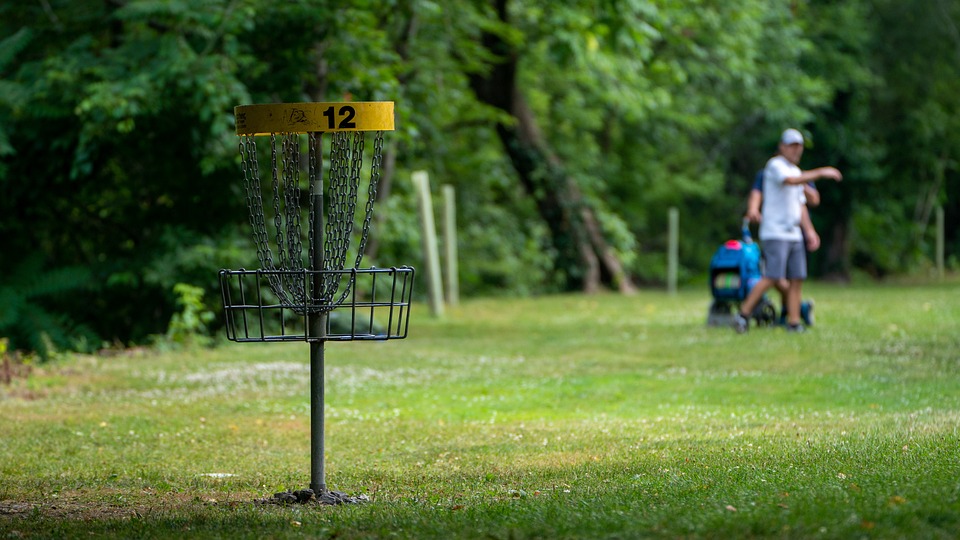As golf industry navigates changing landscape, some course owners, businesses realize new opportunities
Wallace “Ron” Ronald had the vision long before he had the location.
Ronald, who has served as founder or general partner in a number of Hartford-area restaurants, pictured a laid-back, relaxing space that combined the offerings of a brewery with access to meals from popular food trucks, keeping the “menu” fresh and labor costs down.
He eyed locations across Connecticut, including one near the Connecticut River, but ultimately settled on a place closer to home: the former Tower Ridge Country Club in Simsbury, near where he grew up decades ago.
The old clubhouse has been extensively renovated and turned into the Talcott Mountain Collective, which aside from beer offers a deliberately limited menu of pretzels, chili and pizza — to not compete directly with the food trucks — and entertainment such as board games, cornhole sets and outdoor fire pits.
“It’s still a magnificent piece of property,” Ronald said, referring to the site’s panoramic view of Talcott Mountain and the Heublein Tower. “But it was never a proper golf course. Some people enjoyed the challenge of it, but to me it was always a goat pasture.”
Today, some of the former fairways and greens have been repurposed as a disc golf course by a separate business entity, Tower Ridge Disc Golf, headed by David Tolk.
Tolk, who co-designed the 18-hole course, said disc golf is an ideal use for the land, as it takes advantage of the old course layout without the significant expense typically sunk into constant mowing and chemical treatments.
“We’re keeping the recreational spirit of it without all the maintenance costs,” he said. “It’s more environmentally friendly. That is a huge benefit of converting the space.”
While still a fairly unique case, the former Tower Ridge site is one of at least four golf courses in Connecticut to come under new management over the last year.
And while real estate and golf industry experts don’t necessarily see a broader trend unfolding, they acknowledge that mounting costs and declining profitability could in some instances prompt existing golf course owners to offload or lease out their properties, which are typically large and hard work to maintain.
“Some of these golf courses are not as strong as they used to be,” said Tom York, principal of transactional and advisory services at real estate consulting firm Goman+York. “We’re not seeing a trend, but maybe it stands to reason that some property owners are seeing new opportunities now.”
Connecticut has seen little growth in its economy or population over the years, York noted, meaning that golf courses that thrived in better times may not have the financial resources to continue under their existing business model.
“You own a piece of land. It’s either profitable or it’s not, or it’s marginally profitable,” he said. “When you take a look at it — is there something else that makes sense? Is there a higher and better use for that land? Each site will be a little different, but that’s the question each of them needs to ask.”
Aside from Tower Ridge, which is being leased by its new operators, 2021 was a relatively busy time for golf-related real estate deals.
In May, Quarry Ridge Golf Course in Portland was sold for $1.7 million to Nexus Golf Properties.
Around the same time, voters in Southington approved the town’s $4.5 million purchase of development rights to the privately-owned Southington Golf Course, a move expected to prevent the construction of a 114-lot subdivision on the property.
The transfer means that while the land will continue to be owned by the Calvanese and Kastner families, they would give up the right to build on it or use it for anything other than a golf course or recreational green space. The same would apply to any future owners.
And in December, Tallwood Country Club in Hebron was sold by the local McDermott family to Dana Barnes, manager of Concord Golf Properties, for $1.5 million.
Mixed outlook
The idea of financial hardships plaguing golf courses would appear to fly in the face of reports from industry groups trumpeting a major resurgence in the sport during the COVID-19 pandemic.
For much of 2020, golfing venues, which naturally lend themselves to socially-distanced play, were one of the few recreational businesses still up and running. Courses reported a huge increase in players returning to the sport, and beginners just taking it up.
Some courses saw record-setting revenues as a result of the local golf revival, said Tom Hantke, executive director and CEO of the Connecticut Section of the PGA.
But those gains were not evenly distributed across all operators, Hantke pointed out. Municipal golf courses, as well as some private clubs, did well, but some private, member-owned clubs are continuing to struggle with economic factors that first came to a head during the Great Recession.
“The challenges for the private member clubs are capital challenges — bunker upgrades, irrigation systems, aging maintenance equipment,” Hantke said. “Historically the way they paid for that was a loan from the bank, and assessing higher prices on members, but if the membership is shrinking that’s difficult to support.”
According to the CT PGA, which oversees golf courses in Connecticut and western Massachusetts, its region has lost 17 golf courses since the early 2000s, and many of those fit the profile of member-owned clubs that couldn’t support themselves, or family-owned clubs that had no family members willing to take over the reins.
“I think right now, there are some private owners who are looking to exit their family business,” Hantke said, referring specifically to Tallwood.
Hantke said the PGA is aware of the developments at the former Tower Ridge course in Simsbury, but he doesn’t see conversions as the way of the future.
“I don’t see a lot of that repurposing taking place,” he said. “That would be the exception, not the rule.”
In general, Hantke said he’s optimistic about golf in Connecticut, because of the pandemic-inspired surge in interest, and private clubs are investing more money into their operations, making clubhouses amenable to weddings and outdoor dining, and setting up ranges and learning centers to help newcomers pick up the sport.
Barnes, who also acquired Twin Hills Country Club in Coventry in 2018, also sees the positive. There’s no rush to unload golf courses, he said, only “case by case” opportunities that come up as owners, for their own reasons, decide to exit the industry.
Barnes said his group, Concord Golf Properties, is currently in “acquisition mode,” looking to add more sites in Connecticut, southwestern Massachusetts and Rhode Island.
New opportunities
Ronald, of the Talcott Mountain Collective, said he wasn’t initially concerned with using the golf course at Tower Ridge, as he only planned to gut and remodel the clubhouse and use some of the surrounding outdoor space for games. But business associates made the case for a disc golf course, pointing to the sport’s growing popularity and the appeal of an added draw for the Collective.
Now, players can golf for a round or two and then retire to the clubhouse for drinks and food.
“I knew it was not going to be a big expense,” Ronald said. “The truth is, this disc golf helps fulfill my vision. It really rounded out the Collective.”
So far, the conversion has gone off smoothly.
The disc golf course is bringing in a steady stream of returning players, Tolk said, and business is expected to pick up in the spring, as temperatures rise and more people gravitate toward outdoor venues.
The plan is to expand the course, with glow-in-the-dark night disc golf, a summer camp for children and opportunities for corporate events and team-building exercises.
“We want to be the gold standard for a pay-to-play course,” Tolk said.





